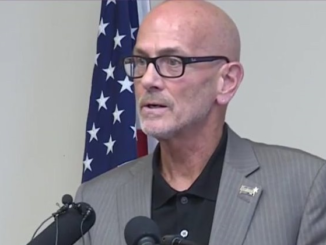
On October 15th the Bismarck Tribune reported that an officer from the Bismarck Police Department had shot and wounded a man in an altercation . We now know that man to be 51-year-old Donald Joseph Miller.

Their article described the events as follows:
“Bismarck Police reported that at 9:47 a.m. Sunday, a male officer arrived at the Bismarck Motor Motel at 2301 E. Main Ave. to follow up on an unrelated call.
“Before the officer could exit his vehicle in the parking lot, the suspect reportedly attacked him, punching the officer repeatedly in the head and gouging his eyes.
“The officer fought back and tried to use his Taser, which proved ineffective, police reported.
“‘The attack continued, and the officer then reached for his firearm, got control of it, and then shot the suspect in the abdomen in order to stop that attack,’ Bismarck Police Chief Dan Donlin said Sunday afternoon.”
Following the altercation, Miller was taken to the local hospital where he received surgical treatment, and the officer whom he allegedly attacked was treated for injuries to the head and eyes.
As a result of the situation, the officer involved was placed on administrative leave, but has since returned to work on restricted duty– meaning he cannot do field work until the investigation is completed by the North Dakota Bureau of Criminal Investigation.
With an on-going investigation playing out, the Bismarck Police Department (BPD) refused to release the name of the officer– a decision that was cited as standard policy for the department. But in addition to that, Sgt. Mark Buschena specifically stated that the officer had invoked Marsy’s Law and that they would therefore not be releasing his name.
As you’re probably aware, Marsy’s Law came about in North Dakota as the result of a ballot measure in last year’s General Election . And while the measure was controversial, it passed with about 62% of the vote– thus amending the state’s constitution to afford crime victim’s additional rights. One of those rights is “to be free from harassment”. You can see the Summary of Victim’s Rights Card here.
But not to be deterred, the Bismarck Tribune pressed forward anyhow with its desire to figure out who the officer was that was involved in the altercation. And not only did they figure out who it was, through an open records request for a copy of a restraining order issued to Miller, but they released the officer’s name in an article published yesterday.
Now, to be fair, Sgt. Buschena was incorrect. For this officer’s specific situation, invoking Marsy’s Law does not protect his name. A fact that is stressed in a document prepared by the North Dakota Attorney General’s Office on the subject:

So, neither Burleigh County nor the Bismarck Tribune were technically violating anything in relation to Marsy’s Law by sharing the officer’s name. But does that make it right on the part of the Tribune?
To be more specific, the person responsible for revealing the officer’s name was Jack Dura. According to his own Facebook page, he’s a “Cops and Courts Reporter” who just started with the Tribune in September.
What exactly did Dura think he stood to gain by making the officer’s name public? What did he really think he was accomplishing? Did he somehow think that this elevates his status as an investigative reporter by doing such a thing? If so, it’s an absolutely ridiculous assertion on his part. And an irresponsible one at that.
By virtue of the fact that the officer invoked Marsy’s Law, it’s obvious that he wanted some sort of added legal protection. Pair that with the fact that the BPD preferred to withhold his name until the investigation was complete, and it causes a person to wonder if Dura simply didn’t understand the reasoning behind these things? Or did he simply not care?
Whether a person believes that Jack Dura’s decision was a crummy reporting move or not, perhaps there’s another issue at hand here. Is the fact that this even happened evidence of the problems associated with Marsy’s Law?
Think about it. If the law only protects a victim’s name in cases of “domestic violence, sexual offenses, sexual performance of a child, or human trafficking”; could it be argued that it doesn’t provide equal protection to victims of other types of crimes? And if so, what would the implications be if the names of all alleged victims could be withheld?
And aside from that, how difficult can it be to locate a person’s contact information – something that is supposed to be protected under Marsy’s Law – if you have their name anyhow? Does the law really even accomplish what it intends to when it comes to protecting victims from harassment?
When I consider this situation, it’s clear to me that the Bismarck Tribune – and more specifically its reporter, Jack Dura – weren’t all that concerned about the officer’s welfare. Nor did they seem to care about the officer’s intent and desire for privacy when he invoked Marsy’s Law.
It also seems to me that the law itself may not accomplish what it was intended to in cases such as this– namely protecting victim’s from the possibility of harassment from others.
But regardless of where a person stands on Marsy’s Law, one thing is certain… Jack Dura and the Bismarck Tribune had the chance to do something that Marsy’s Law doesn’t in this situation– to protect the name of an alleged victim. And instead, they chose to expose it. Fair or foul?
(Editorial Note: Just yesterday, the Montana Supreme Court ruled that state’s initiated version of Marsy’s Law to be unconstitutional– meaning the process by which the law was changed was problematic. For more on that, see the article here.)
Sources:
1. http://bismarcktribune.com/news/local/crime-and-courts/suspect-shot-after-allegedly-attacking-officer/article_d9c3b7f6-4d5c-5c53-ba7a-5d7ebacfa5e5.html 2. http://bismarcktribune.com/news/local/crime-and-courts/man-arrested-for-attacking-officer-before-related-shooting/article_21fe18ab-e9f4-52bd-9ba0-8a7184452436.html 3. https://attorneygeneral.nd.gov/sites/ag/files/documents/MarsysLaw-Guidance.pdf
4. https://ballotpedia.org/North_Dakota_Crime_Victim_Rights,_Initiated_Constitutional_Measure_3_(2016) 5. https://attorneygeneral.nd.gov/sites/ag/files/documents/MarsysCard-2onaPage-Duplex.pdf
6. https://www.facebook.com/jack.dura.7
7. http://www.greatfallstribune.com/story/news/2017/11/01/montana-supreme-court-marsys-law-initiative-unconstitutional-victims-rights/822077001/





